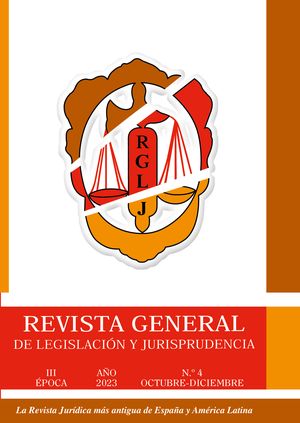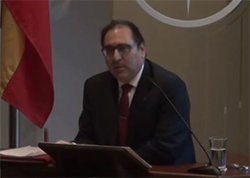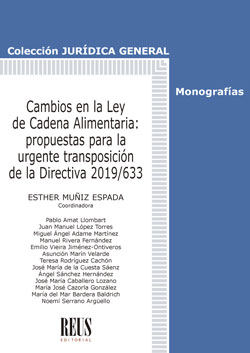La configuración unitaria y el derecho de superficie rústica en el Derecho común
Artículo publicado en: Revista General de Legislación y Jurisprudencia 04/2023

- Artículo publicado en: Revista General de Legislación y Jurisprudencia
- Numero: 04/2023
- Fecha: 2023-12-29
- ISSN: 0210-8518
- Páginas: 40 (659 - 698)
- Idioma: español (castellano)
- Editorial: Editorial Reus
- Palabras Clave:
código civil,
derecho de superficie rústica,
postura unitaria
- Materias:
Derecho Civil
- Materias thema:
LAFD
- DOI: https://doi.org/10.30462/rglj-04-03-945
La configuración unitaria y el derecho de superficie rústica en el Derecho común
Artículo publicado en: Revista General de Legislación y Jurisprudencia 04/2023
Autoría: Ángel Sánchez Hernández
20,00€
En el Derecho común, el derecho de superficie rústica está dotado de naturaleza real y, excluyendo el principio «superficies solo cedit», atribuye al superficiario la propiedad separada sobre lo construido o plantado en suelo ajeno —por él mismo o por el dueño de éste— hasta que, por extinción del derecho —siempre temporal—, tal dominio revierta al dueño del suelo lo así construido o plantado. Ese derecho, permite realizar una actividad agraria sobre tierras —vg. su explotación forestal— y además de la actividad agraria, otras actividades como las dirigidas a establecer instalaciones fotovoltaicas y otras para la energía eólica o geotérmica (energías renovables), en un mercado necesitado de energías alternativas.
Dada la practica inexistente regulación de este derecho en el Código Civil (art. 1611.3), la regulación de este «iura in re aliena», se rige por los preceptos —53 y 54— del R. D. Legislativo 7/2015, de 30 de octubre, por el que se aprueba el texto refundido de la Ley de Suelo y Rehabilitación Urbana (que a la luz de la STC de 20 de marzo de 1997, es legislación civil —art. 149.1.8ª CE—), y en lo no previsto por aquella y subsidiariamente por otras legislación civil, por su título constitutivo (autonomía privada, merced del pacto), y en su defecto, por la costumbre y los principios generales del Derecho.
Si bien, las figuras posibles de este derecho pueden ser numerosas si atendemos a la amplia libertad de configuración, resulta clara y manifiesta la intención unificadora del legislador: la Ley del suelo es preferente, sin olvidar el resto de la legislación civil y la voluntad expresada en el título constitutivo.
I. INTRODUCCIÓN: ANTECEDENTES Y FUENTES DEL DERECHO DE SUPERFICIE.– II. CONCEPTO.– III. NATURALEZA JURÍDICA.– IV. RÉGIMEN JURÍDICO DEL DERECHO DE SUPERFICIE RÚSTICA: 1. Contenido.– 2. Constitución.– 3. Características.– V. DERECHOS Y OBLIGACIONES DEL CONCEDENTE Y DEL SUPERFICIARIO.– VI. EXTINCIÓN.
Description
In common law, the farming surface right is endowed with a in rem nature and, excluding the principle «superficies solo cedit», attributes to the surface owner separate ownership on what was built or planted on another’s land – by himself or by the owner of this – until, by extinction of the right—always temporary – such ownership reverts to the owner of the land as constructed or planted. This right allows one to carry out an agricultural activity on land – eg. forestry – and in addition to agricultural activity, other activities such as those aimed at establishing photovoltaic installations and others for wind or geothermal energy (renewable energies), in a market in need of alternative energies. Given the practically non-existent regulation of this right in the Civil Code (art.1611.3), the regulation of this «iura in re aliena» is governed by two articles – 53 and 54 – of Legislative R. D. 7/2015, of October 30, that approves the consolidated text of the Land and Urban Rehabilitation Law (according the ruling STC of March 20, 1997, is civil legislation – art. 149.1.8ª CE), and in matters not provided for in this law and subsidiarily by other civil legislation, by its constitutive title (agreed by pact according to contractual freedom), and failing that, by custom and general principles of law. Although the possible varieties of said right may be numerous if we consider the wide freedom of configuration, the unifying intention of the legislator is clear and manifest: the Land Law is preferential, without forgetting the rest of the civil legislation and the expressed will in the constitutive title.



